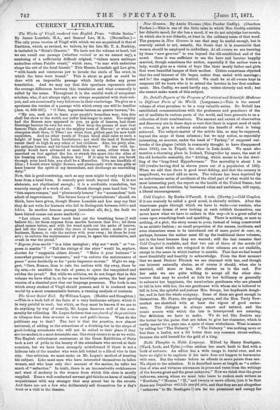CURRENT LITERATURE.
The Works of Virgi4 rendered into English Prose. "Globe Series." By James Lonsdale, MA., and Samuel Lee, M.A. (Macmillan.)— The only prose version of Virgil with which we are acquainted is that of Davidson, which, as revised, we believe, by the late Mr. T. A. Buckley, is included in "Bohn's Classics." We have not the volume at hand, but we can recall one passage (whether revised or no we cannot say), a rendering of a sufficiently difficult original, " violare mann malisque audacibus orbem Fatalis crusti," which runs, "to mar with audacious chaps the orb of the fatal biscuit." This Messrs. Lonsdale and Lee give, 4' with hands and venturous jaw to invade the circle of the crust, in which the fates were bound." This is about as good as could be done with' an impossible passage which fairly defies any prose translation. And we may say that this specimen represents about the average difference between this translation and what commonly is called by the name. Throughout it is the careful work of competent scholars, who, if not always right, are always acquainted with their sub- ject, and are occasionally very felicitous in their renderings. We give as a specimen the version of a passage with which every one will be familiar (Aen. vi. 869-887). "0 Nate, ingentem lactum ne quaere tuorum," are.
"My son, seek not to learn your people's boundless woe ; him fate shall but show to the world, nor suffer him longer to exist. Too mighty had the Roman race appeared to you, ye gods of heaven, had these blessings become its own for ever. How deep the groans of men that famous Plain shall send up to the mighty town of Mayors ! or what sad obsequies shalt thou, 0 Tiber ! see when thou glidest past his new-built sepulchre. And no other youth of Trojan blood shall raise to such a height of hope his Latin forefathers ; nor shall the land of Romulus vaunt itself so high in any other of her children. Alas, his piety, alas, his antique honour, and his hand invincible in war ! No one with im- punity would have advanced to meet him in arms, either when he marched on foot against the foe, or struck the spurs into the sides of his foaming steed. Alas, hapless boy ! If it may be that you break through your hard fate, you shall be a Marceline. Give me handfuls of lilies ; I would strew bright flowers, and plenteously with these gifts at least honour the spirit of my descendant, and discharge an unavailing duty."
Now, this is good construing, such as any man might be only too glad to hear from a head form. It scarcely goes much beyond this. It is not elaborate, not rhythmical enough ; it is a creditable translation, but scarcely enough of a work of art. "Break through your hard fate" for "fain aspera rumpas," and "plenteously honour" for " accumulem" both admit of improvement. The future force of "pAeterlabere" should, we think, have been given, though Messrs. Lonsdale and Lee may say that they do not write for learners who fail to distinguish between labere and labere. In another famous passage (excudent alii, ite.), the fault we have hinted comes out more markedly :— " Let others with finer touch beat out the breathing brass (I well believe it); let them express from marble features that live ; let them plead causes better, and with the wand mark out the paths of heaven, and tell the times at which the stars of heaven arise ; make it your business, Roman, to rule the nations with your sway ; let these be your arts ; to enforce the maintenance of peace, to spare the submissive, and crush in war the proud."


































 Previous page
Previous page